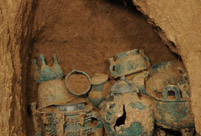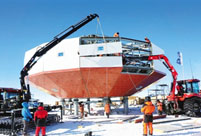FEELING THE PRESSURE
Wang Anshun, the mayor of Beijing, told media half-jokingly on the sidelines of Beijing's legislature meeting in January that leaders at the State Council will want his "head off his chest" if he fails to improve the capital's air quality by 2017.
While this could be a jest, the pressure Chinese officials carry on their shoulder is no laughing matter.
Tackling air pollution is the most urgent task for officials. It has become a key criteria for how they are judged, and the absence of progress over time could spell the end of their career.
Such concern keeps officials in Beijing on the edge of their seat. While the annual two sessions could likely begin under the choking smog, they will have little more than six months to prepare for a summit of the Asia Pacific Economic Cooperation in the fall. Hosting leaders around the Pacific rim under smothering conditions is the last thing they want on their record.
The smog hanging over Beijing will not clear unless its neighbors take concrete steps to reduce emissions. This has already exacted an economic toll on Hebei, the province that surrounds Beijing and produces a quarter of China's steel.
The capacity these steel mills added over the years has also spewed more particles into the northern Chinese sky. China Environmental News, a newspaper affiliated with the Ministry of Environmental Protection, reported in January that Hebei's goal to slash production of both coal and steel by 1.5 million tonnes this year could see the province lose 3 percent of its economic output.
"Steel, cement, glass, any extra ton of these products added in Hebei will put an end to an official's tenure," said Hebei Governor Zhang Qingwei in a recent interview.
 |  |
 Chinese Dream: the Chinese Spirit and the Chinese Way
Chinese Dream: the Chinese Spirit and the Chinese Way 51 bronze sacrificial utensils unearthed in Shaanxi
51 bronze sacrificial utensils unearthed in Shaanxi Most gorgeous female celebs in Chi-pao
Most gorgeous female celebs in Chi-pao Second round of test kicks off at Beijing Film Academy
Second round of test kicks off at Beijing Film Academy Ancient Qiang people had vertically grown teeth
Ancient Qiang people had vertically grown teeth Top 10 Chinese youth’s favorite seaside destinations
Top 10 Chinese youth’s favorite seaside destinations Traditional Tibetan clothing tailors
Traditional Tibetan clothing tailors In photos: Unveiling Taishan station
In photos: Unveiling Taishan station Beautiful moments of family reunion
Beautiful moments of family reunion Chinese warplanes C919 to appear at Singapore Airshow
Chinese warplanes C919 to appear at Singapore Airshow Ruins of Shang Dynasty's structure unearthed in Shaanxi
Ruins of Shang Dynasty's structure unearthed in Shaanxi  Intercity high speed train in operation
Intercity high speed train in operation Severe coldness freezes large parts of China
Severe coldness freezes large parts of China  Beautiful moments of Sochi
Beautiful moments of Sochi  It's not just performing this year
It's not just performing this yearDay|Week|Month